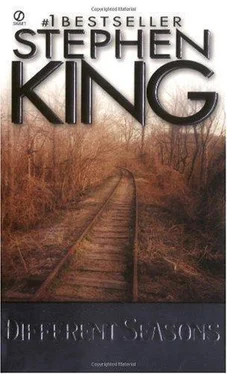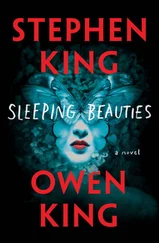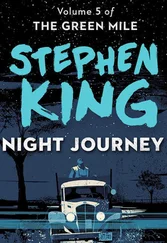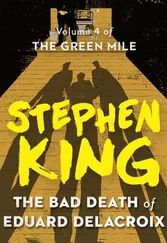'Stud City,' Chico says. 'In his new stud car. Funky.'
He tastes puke on his lips and in his throat and coating his sinuses. He doesn't want a cigarette. Danny Carter will let him sleep over. Tomorrow will be time enough for further decisions. He pulls back into Route 14 and gets rolling.
8
Pretty fucking melodramatic, right?
The world has seen one or two better stories, I know that -one or two hundred thousand better ones, more like it. It ought to have THIS IS A PRODUCE OF AN UNDERGRADUATE CREATIVE WRITING WORKSHOP stamped on every page ... because that's just what it was, at least up to a certain point. It seems both painfully derivative and painfully sophomoric to me now; style by Hemingway (except we've got the whole thing in the present tense for some reason - how too fucking trendy), theme by Faulkner. Could anything be more serious! More lit'ry?
But even its pretensions can't hide the fact that it's an extremely sexual story written by an extremely inexperienced young man (at the time I wrote Stud City, I had been to bed with two girls and had ejaculated prematurely all over one of them - not much like Chico in the foregoing tale, I guess). Its attitude towards women goes beyond hostility and to a point which verges on actual ugliness - two of the women in Stud City are sluts, and the third is a simple receptacle who says things like 'I love you, Chico,* and 'Come in, I'll give you cookies.' Chico, on the other hand, is a macho cigarette-smoking working-class hero who could have stepped whole and breathing from the grooves of a Bruce Springsteen record - although Springsteen was yet to be heard from when I published the story in the college literary magazine (where it ran between a poem called Images of Me and an essay on student parietals written entirely in the lower case). It is the work of a young man every bit as insecure as he was inexperienced.
And yet it was the first story I ever wrote that felt like my story - the first one that really felt whole, after five years of trying. The first one that might still be able to stand up, even with its props taken away. Ugly but alive. Even now when I read it, stifling a smile at its pseudo-toughness and its pretensions, I can see the true face of Gordon Lachance lurking just behind the lines of print, a Gordon Lachance younger than the one living and writing now, one certainly more idealistic than the best-selling novelist who is more apt to have his paperback contracts reviewed than his books, but not so young as the one who went with his friends that day to see the body of a dead kid named Ray Brewer. A Gordon Lachance halfway along in the process of losing the shine.
No, it's not a very good story - its author was too busy listening to other voices to listen as closely as he should have to the one coming from inside. But it was the first time I had ever really used the places I knew and the things I felt in a piece of fiction, and there was a kind of dreadful exhilaration in seeing things that had bothered me for years come out in a new form, a form over which I had imposed control. It had been years since that childhood idea of Denny being in the closet of his spookily preserved room had occurred to me; I would have honestly believed I had forgotten it Yet there it is in Stud City, only slightly changed... but controlled.
I've resisted the urge to change it a lot more, to rewrite it, to juice it up - and that urge was fairly strong, because I find the story quite embarrassing now. But there are still things in it I like, things that would be cheapened by changes made by this later Lachance, who has the first threads of grey in his hair. Things, like that image of the shadows on Johnny's white tee-shut or that of the rain-ripples on Jane's naked body, that seem better than they have any right to be.
Also, it was the first story I never showed to my mother and father. There was too much Denny in it. Too much Castle Rock. And most of all, too much 1960. You always know the truth, because when you cut yourself or someone else with it, you bleed.
9
My room was on the second floor, and it must have been at least ninety degrees up there. It would be a hundred and ten by afternoon, even with all the windows open. I was really glad I wasn't sleeping there that night, and the thought of where we were going made me excited all over again. I made two blankets into a bedroll and tied it with my old belt. I collected all my money, which was sixty-eight cents. Then I was ready to go.
I went down the back stairs to avoid meeting my Dad in front of the house, but I hadn't needed to worry; he was still out in the garden with the hose, making useless rainbows in the air and looking through them.
I walked down Summer Street and cut through a vacant lot to Carbine - where the offices of the Castle Call stand today. I was headed up Carbine towards the clubhouse when a car pulled over to the kerb and Chris got out. He had his old Boy Scout pack in one hand and two blankets rolled up and tied with clothesrope in the other.
Thanks, mister,' he said, and trotted over to join me as the car pulled away. His Boy Scout canteen was slung around his neck and under one arm so that it finally ended up banging on his hip. His eyes were sparkling.
'Gordie! You wanna see something?'
'Sure, I guess so. What?'
'Come on down here first.' He pointed at the narrow space between the Blue Point Diner and the Castle Rock Drug Store.
'What is it, Chris?'
'Come on, I said!'
He ran down the alley and after a brief moment (that's all it took me to cast aside my better judgment) I ran after him. The two buildings were set slightly towards each other rather than running parallel, and so the alley narrowed as it went back. We waded through trashy drifts of old newspapers and stepped over cruel, sparkly nests of broken beer and soda bottles. Chris cut behind the Blue Point and put his bedroll down. There were eight or nine garbage cans lined up here and the stench was incredible.
'Phew! Christ Come on, gimme a break!'
'Gimme your arm,' Chris said, by rote.
'No, sincerely, I'm gonna throw u -'
The words broke off in my mouth and I forgot all about the smelly garbage cans. Chris had unslung his pack and opened it and reached inside. Now he was holding out a huge pistol with dark wood grips.
'You wanna be the Lone Ranger or the Cisco Kid?' Chris asked, grinning.
'Walking, talking Jesus! Where'd you get that?'
'Hawked it out of my dad's bureau. It's a .45.'
'Yeah, I can see that,' I said, although it could have been a .38 or a .357 for all I knew - in spite of all the John D MacDonalds and Ed McBains I'd read, the only pistol I'd ever seen up close was the one Constable Bannerman carried ... and although all the kids asked him to take it out of its holster, Banner never would. 'Man, your dad's gonna hide you when he finds out. You said he was on a mean streak anyway.'
His eyes just went on dancing. 'That's it, man. He ain't gonna find out nothing. Him and these other rummies are all laid up down in Harrison with six or eight bottles of wine. They won't be back for a week. Fucking rummies.' His lips curled. He was the only guy in our gang who would never take a drink, even to show he had, you know, big balls. He said he wasn't going to grow up to be a fucking tosspot like his old man. And he told me once privately - this was after the DeSpain twins showed up with a six-pack they'd hawked from their old man and everybody teased Chris because he wouldn't take a beer or even a swallow - that he was scared to drink. He said his father never got his nose all the way out of the bottle anymore, that his older brother had been drunk out of his tits when he raped that girl, and that Eyeball was always guzzling purple Jesuses with Ace Merrill and Charlie Hogan and Billy Tessio. What, he asked me, did I think his chances of letting go of the bottle would be once he picked it up? Maybe you think that's funny, a twelve-year-old worrying that he might be an incipient alcoholic, but it wasn't funny to Chris. Not at all. He'd thought about the possibility a lot. He'd had occasion to.
Читать дальше











